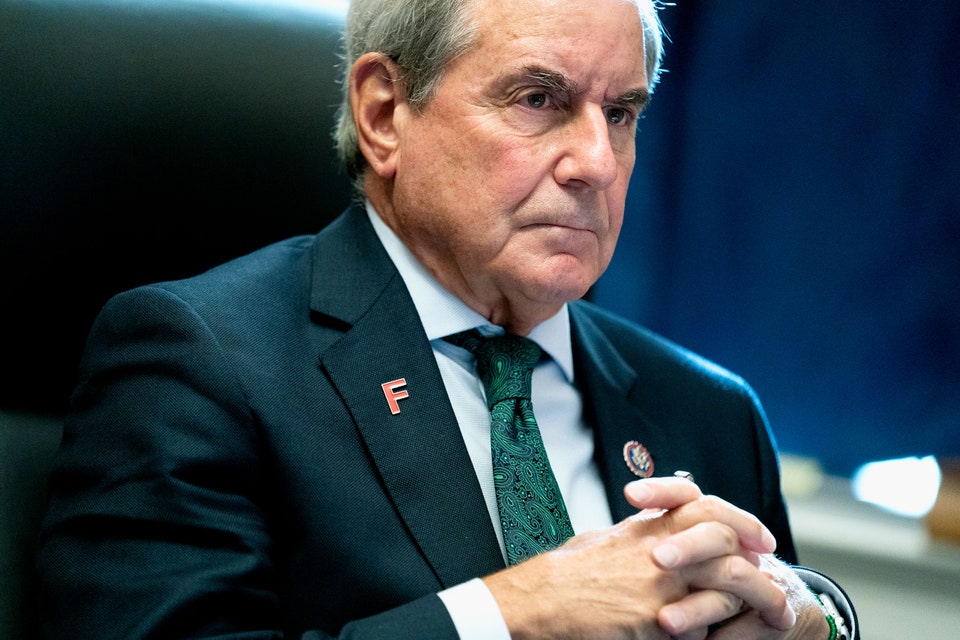A Retiring Democrat Places Blame for Paralysis in Congress
The Kentucky representative John Yarmuth fears for the country’s democratic—and Democratic—future, but expresses hope for President Biden’s legislative agenda.

by Jane Mayer | October 28, 2021

It was too early in the afternoon for Representative John Yarmuth, of Kentucky, to open the bottle of Larceny bourbon that he keeps in his Capitol Hill office, but the situation he described might drive anyone to drink. Yarmuth, who turns seventy-four next week, is one of a dozen House Democrats who have announced their intention to retire or seek other offices. The rush to the exits has triggered speculation that veteran Democrats believe their party’s four-vote majority in the House is doomed. Yarmuth is leaving at the peak of his power. He is the chairman of the House Budget Committee, a powerful position that takes years of seniority to gain and which gives him a central role in the protracted talks between Democratic factions which have, so far, prevented the Party from reaching a grand bargain on Joe Biden’s ambitious domestic agenda.
Yarmuth insisted that his reasons for retiring are “ninety-five-per-cent” personal. “I just wanted more control over my time,” he told me. He also contended that the Democrats have “at least a fifty-fifty chance” of holding the House in next year’s midterm elections. His district, which encompasses Louisville, is Kentucky’s only remaining Democratic stronghold in Congress, and will likely be safe. But Yarmuth, a thoughtful former newspaper editor, couldn’t conceal his profound fears about the changes that he has witnessed in both parties during his eight terms in Congress—and for the future of American democracy. “Omigod, yes,” he said, when asked if he was worried. He recounted how, in 2019, he’d warned local Rotary Club members that, if they didn’t think American democracy was in great jeopardy, they weren’t paying attention. Since then, he told me, “it’s only gotten worse.”
Once Donald Trump was defeated, in 2020, Yarmuth acknowledged, he, like many Democrats, felt a false sense of relief: “We all felt, ‘Whew, we can relax.’ ” He said, “People may still think that elsewhere in the country, but in Congress no one thinks that now. Yet,” he added, “we’re all just sitting here waiting for Kyrsten Sinema and Joe Manchin to save democracy. But they won’t bend on the filibuster.”
With future Democratic control of the Senate and White House also very much in question, Yarmuth expressed frustration with President Biden. “I do fault him,” he said, looking pained. “I think he’s been too slow.” If Biden doesn’t speak out against the Senate filibuster rule soon, in order to save the John Lewis voting-reform act, Yarmuth told me, then “all opportunity to save democracy may be lost. I think he needs to think very hard about his place in history at this point.” (Shortly after we spoke, Biden did, in fact, signal his support for changing or eliminating the filibuster, albeit cryptically.)
Surprisingly, perhaps, Yarmuth didn’t blame Trump entirely for the crisis in Congress. “Trump didn’t cause it. It’s the one thing I won’t blame him for,” he said. As Yarmuth sees it, Congress was taken over by media-obsessed performance artists, who would rather attract attention than govern, starting with the rise of the Tea Party, in 2010. Conservatives who entered Congress that year—many of whom now identify with the Freedom Caucus—had no chance of enacting any legislation that President Barack Obama would sign, so, Yarmuth said, “all they wanted to do was blow things up.”
Yarmuth lamented the changes on Capitol Hill since his arrival, in 2007. “It was different when I got here,” he said. “There were Republicans who were really thoughtful and wanted to do things. The Republicans were engaged in discussions,” he said. Now, however, “you have a Republican Party that has no interest in governing.” Starting in 2010, he added, the G.O.P.’s far-right minority ritually began to oppose anything Democrats supported, including commonsense public policies, such as insuring clean water and clean air. They adamantly opposed Obama’s health-care plan, calling for it to be repealed and replaced—but never actually offering any viable alternative. “All these guys would do was throw red meat to their base and donors,” Yarmuth said. “It was all just symbolic.”
The growing need to please big campaign donors, Yarmuth pointed out, has played a huge part in democracy’s breakdown. The Supreme Court’s Citizens United ruling, in 2010, which struck down most restrictions on campaign spending, enormously increased candidates’ reliance on rich and often politically extreme outside groups and contributors. “If you represent a congressional district in rural Kentucky, and you need to raise a couple million dollars, you can’t do it in that district, so what are you going to do? You have to call national donors and groups. And they want ‘reliable’ voters. People who will vote with the Party.” What they don’t want are officeholders who might cross party lines to act independently. “The political world’s gotten so tribal,” Yarmuth said. “They will vote for you no matter what you do so long as you have their team’s jersey on.”
Performative partisanship now afflicts some Democrats, too, Yarmuth admitted. He is frustrated with House members who, in the midst of the negotiations over the Democrats’ most ambitious domestic program in years, “have drawn red lines and said, ‘I won’t vote for it if it doesn’t have this.’ ” Yarmuth is a member of the Congressional Progressive Caucus, but he says the only thing he’s been advocating for is to get all the various Democratic factions to unite and compromise. The holdouts, he suggested, “are all members who have not served in a governing majority—they’ve all come here since 2010.” Although they may have served elsewhere, he said, Congress is different: “You have people from all over the country with very different perspectives and priorities.” One lesson that newcomers haven’t learned, he said, is that it’s better to negotiate behind closed doors rather than on cable television. “We played it quiet,” he said, of how he reached deals in the past. In contrast, he said, “this is their first time when they actually have the opportunity to pass something, and they all think, Oh, gosh, this is our big shot, so I want to be a player!” Perhaps it’s Trump’s influence, but “they all need the attention.”
For someone like Yarmuth, who passionately believes that government can do good, the perilous state of American democracy is stunning. “I’d like to think that January 6th was an aberration,” he said, “but I know that it wasn’t.” What bewilders him, though, is what is driving this transformation. “The amount of anger that is in the country right now surprises me,” he said, “because it doesn’t seem to be based on anything real.”
In fact, he feels that government can not only work—it can make an enormous difference, as seen in congressional legislation targeting the covid-19 pandemic. On the night, this past March, that Congress passed the American Rescue Plan, which has Yarmuth’s name on it, he stayed behind in his congressional office until well past 2 a.m. As he drove home, he told me, the awe-inspiring impact of the $1.9-trillion economic package to boost vaccine distribution, stave off economic hardship, open schools, and get people back to work “hit me all at once. Millions of lives would be changed because of it. I just totally lost it.” Soon after, when he was back in Kentucky, he said, “my phone rang”—it was an unfamiliar, “weird number with a whole lot of zeros. I thought, That’s interesting, so I took the call.”
A voice said, “The President would like to speak to you.” Biden and Yarmuth talked about the bill and a bit about Kentucky’s senior senator, Mitch McConnell, with whom Yarmuth has sparred for decades. “I held it together” during the call, he said. “But, as soon as I hung up, I totally lost it again. Who’d have thought we could pass something like this?” As Yarmuth described one of the greatest moments of his legislative career, at one of the worst moments in American politics, he dabbed his eyes, which had filled with tears.
Yarmuth said he remains optimistic that Democrats can reach an agreement and pass another breathtakingly ambitious package of domestic programs. “I think we’re going to get something done. It will be big. So all this stuff about not being able to govern will go away,” he predicted. He also took solace in his doubts that Trump—whom he calls “a sick person”—will run for President again. Yarmuth thinks that Trump will be too beset by legal problems, and too afraid of losing. “And,” he suggested, somewhat mischievously, if Trump runs again, “my guess is that Melania’s gone from his life.”
As for himself, he said that he is looking forward to spending more time with his two-year-old grandson and to teaching, and that he will stay in the public arena one way or another. He said he would miss his friends in Congress, and likely be “miserable” his first day out of office. Maybe that’s what was getting to him. But it was hard not to suspect that he was weeping out of concern for what may come next in this country.

